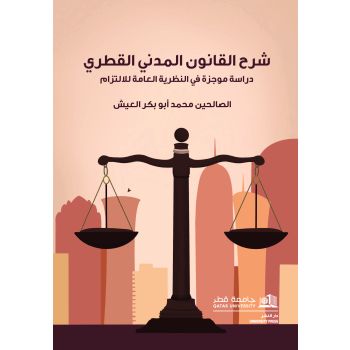شرح القانون المدني القطري دراسة موجزة في النظرية العامة للالتزام
يقدم هذا الكتاب عرضًا موجزًا لنظرية الالتزامات في القانون المدني القطري، وهو ينقسم إلى جزأين؛ الأول لشرح مصادر الالتزام الخمسة، وهي: العقد، والإرادة المنفردة، والعمل غير المشروع، والإثراء بلا سبب، والقانون. والثاني لشرح أحكام الالتزام، وتتضمن ما يترتب على الالتزام من آثار، وما يمكن أن يدخل عليه من أوصاف، كما تتناول انتقال الالتزام، وأسباب انقضائه.
يركز الكتاب – بإيجاز – على شرح نصوص القانون المدني القطري وتحليلها، دون الإسهاب في الجوانب التاريخية والمسائل الفقهية الخلافية، ولذلك فهو يناسب شرائح مختلفة من المتخصصين في العلوم القانونية من طلبة وباحثين ومشتغلين. وقد دُعّم بعدد كبير من قرارات محكمة التمييز القطرية ذات الصلة بموضوعاته، وذلك لمساعدة القارئ على الربط بين الجوانب النظرية والتطبيقات العملية. كما تضمن – في مواقع متفرقة منه – آخر التعديلات التشريعية المهمة التي طرأت على القانون المدني الفرنسي في عامي 2016 و2018 وذلك بوصفه مصدرًا تاريخيًا للقانون المدني القطري.
This book provides a brief overview of the theory of obligations in Qatari civil law and is divided into two parts; the first is to explain the five sources of obligation: contract, unilateral will, tort (omissive responsibility), Beneficial act (Unjustified Enrichment) and law. The second is to explain the effects of the obligation, which contain the effects of the obligation, the possible descriptions thereof, as well as the transfer of the obligation and the reasons for its termination.
The book focuses on explaining and analyzing the texts of the Qatari civil law without elaborating on historical aspects and controversial doctrinal issues. Therefore, it is quite suitable for different segments of legal science specialists, including students, researchers and practitioners. It has been supported by a large number of relevant decisions of the Qatari Court of Cassation to help the reader connect the theoretical aspects with practical applications. Furthermore, it includes, in various occasions, the latest important legislative amendments that took place in the French Civil Code in 2016 and 2018, as a historical source of the Qatari Civil Law.

